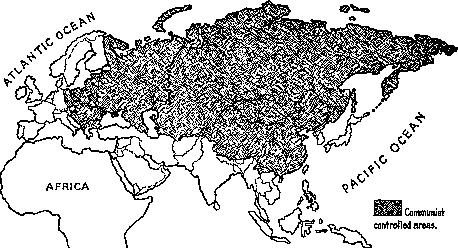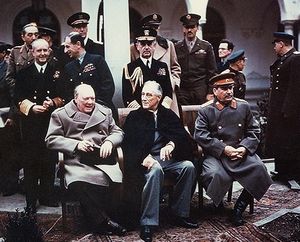Yalta Conference
 From Conservapedia
From Conservapedia The Yalta Conference was the meeting in February of 1945, the last year of World War II, between President Franklin Roosevelt, Soviet Premier Joseph Stalin and British Prime Minister Winston Churchill (the big three) at Yalta on the Crimean Peninsula in the USSR. The conference was held at the Livadia Palace, a former summer home of the Tsars in the Crimea. It opened February 4, 1945. the chief questions were:
- (1) the adoption of the Dumbarton Oaks plan for the United Nations
- (2) the conditions of the approaching German surrender
- (3) the treatment of Poland and the other countries occupied by the Red Army.
It was during this conference that Roosevelt saw a significant decrease in his health. Upon his return to the United States, he soon became very ill and died in April. The agreement was drafted by Sir Gladwyn Jebb, representing Great Britain, Andrei Gromyko, representing the Soviet Union, and Alger Hiss, representing the United States.[1]
The Yalta Conference had many lasting agreements for the post-World War II order which are still evident in the 21st century; many American soldiers who enlisted and risked their lives for the right of self determination of peoples felt particularly betrayed when the substance of the agreements became known, paving the way for the rise in popularity of men like Gen. Douglas MacArthur, Sen. Joseph McCarthy, President Dwight Eisenhower, and a rebirth of the Republican Party after twenty years of New Deal socialism.
Contents
Western betrayal[edit]

The United Nations plan, which had been agreed to in principle by Soviet Union long before, was no longer an issue. There was the question of voting to be settled and this was done without any difficulty by agreeing in full to Stalin's desires. The formal proposal to hand over eastern Poland east of the Curzon line was made by Roosevelt himself.[2] In western Poland, Stalin already had a government there representing no one but Stalin. FDR agreed, however, that this provisional government should be "reorganized" to include "democratic leaders from Poles abroad." Stalin agreed to hold an election, which he said "he could do in a month." The election was not held for 23 months and Poland ended with nothing but Communists in the government [3] of a country where they did not represent 10 per cent of the people, while the other elements fled Poland for their lives. To compensate Poland it was agreed to give Poland a part of East Prussia, a totally German land. The Yalta conference was, as it has come to be known in Poland, Eastern Europe, China, and much of the world, the Western betrayal of democratic allies who had fought for the principals of self-determination.
The main agreement of the conference regarded the decision for an unconditional surrender of the Nazis. They agreed to divide Germany into four occupation zones, with Berlin itself further divided into zones. They also agreed that free elections would be held in Soviet controlled Eastern Europe, but Stalin never had any intention of fulfilling this promise. The USSR also agreed to take part in the war against Japan, though they played a negligible role.
Sellout of China[edit]
Roosevelt agreed that the Kurile Islands would be handed to Russia, as well as southern Sakhalin Island, internationalization of the Port of Dairen (Dalian), the lease of Port Arthur (Lushun) as a naval base and joint operation of the Chinese Eastern Railway and South Manchuria Railway.[4]
Japan asks for peace[edit]
On the eve of Yalta conference the Japanese Foreign Minister asked the Russian Ambassador in Tokyo about the possibility of arranging for a settlement. Stalin did not communicate this to either Roosevelt or Churchill.[5]
Operation Keelhaul[edit]
Roosevelt agreed to have all refugees from Soviet communism or citizens of satellite nations and tens of thousands of POW's who elected to stay this side of the Iron Curtain, returned to the Soviet Union. This was in contravention of the Geneva Convention. The Saturday Evening Post commented:
| “ | With this shameful agreement as their authority, Russian MVD agents strode through the displaced-persons camps after the war and put the finger on thousands who had managed to escape the Soviet tyranny. These miserable victims were herded into boxcars and driven back to death, torture or the slow murder of the Siberian mines and forests. Many killed themselves on the way. Also under a Yalta agreement, the Russians were permitted to use German prisoners in forced labor as an item in 'reparations account.' For such inhumanities there is no excuse.[6] | ” |
Roosevelt told a joint session of the U.S. Congress upon his return that the Yalta conference "marked the end of the system of unilateral action and exclusive alliance and spheres of influence and balances of power and all the other expedients that have been tried for centuries and have always failed." [7]
The New Republic, whose editors included FDR speechwriter and Soviet spy Michael Straight, published soon afterwards, "on the whole, the results at Yalta represent a substantial victory for Stalin." [8]
Nobel laureate Alexander Solzhenitsyn was a Captain in the Red Army only to be rewarded with a term in the Soviet Gulag for dissenting from Socialist thought, remarked
| “ | In their own countries Roosevelt and Churchill are honored as embodiments of statesmanlike wisdom. To us, in our Russian prison conversations, their consistent shortsightedness and stupidity stood out as astonishingly obvious. How could they, in their decline from 1941 to 1945, fail to secure any guarantees whatever of the independence of Eastern Europe? How could they give away broad regions of Saxony and Thuringia in exchange for the preposterous toy of a four-zone Berlin, their own future Achilles' heel? And what was the military or political sense in their surrendering to destruction at Stalin's hands hundreds of thousands of armed Soviet citizens determined not to surrender? They say it was the price they paid for Stalin's agreeing to enter the war against Japan. With the atom bomb already in their hands, they paid Stalin for not refusing to occupy Manchuria, for strengthening Mao Tse-tung in China, and for giving Kim Il Sung control of half Korea! What bankruptcy of political thought! And when subsequently, the Russians pushed out Mikolajczyk, when Benes and Masaryk came to their ends, when Berlin was blockaded, and Budapest flamed and fell silent, and Korea went up in smoke, and Britain’s Conservatives fled Suez, could one really beleive that those among them with the most accurate memories did not at least recall that episode of the Cossacks? [9][10][11] | ” |
Further reading[edit]
- The Yalta Betrayal, Felix Wittmer, Claxton Printers, 1953.
- Agreements Reached at Yalta
- Military History Online
See also[edit]
References[edit]
- ↑ While You Slept: Our Tragedy in Asia and Who Made It, John T. Flynn, New York: The Devin-Adair Company, 1951, pg. 148 pdf.
- ↑ Speaking Frankly, James F. Byrnes, New York: Harper & Bros., 1947, p. 29.
- ↑ Speaking Frankly, Byrnes, op.cit., p. 32.
- ↑ Byrnes, op.cit., p. 32. pg. 43.
- ↑ While You Slept John T. Flynn, pg. 168 pdf.
- ↑ Saturday Evening Post, Editorial, April 11, 1953, pg. 12.
- ↑ Report to Congress by President Franklin D. Roosevelt On the Crimea Conference, March 1, 1945.
- ↑ New Republic, February 19, 1945, p. 243.
- ↑ Gulag Archipelago, Alexander Solzhenitsyn, 1956, Part I. Chap. 4., pg. 258 fn. 12
- ↑ Repatriation — The Dark Side of World War II, Part 3 by Jacob G. Hornberger, April 1995. Retrieved from the Future of Freedom Foundation, August 21, 2007.
- ↑ Andrei Andreyevich Vlasov, from Alexander Solzhenitsyn, The Gulag Archipelago, v.i, p. 252, fn. 8.
Categories: [World War II]
↧ Download as ZWI file | Last modified: 02/09/2023 19:12:43 | 1 views
☰ Source: https://www.conservapedia.com/Yalta_conference | License: CC BY-SA 3.0
 ZWI signed:
ZWI signed:
 KSF
KSF